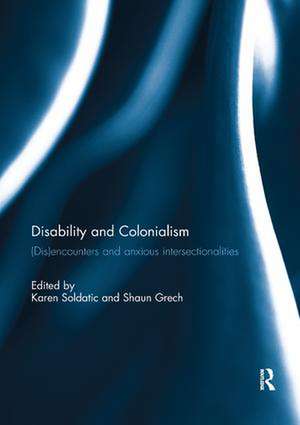Disability and Colonialism: (Dis)encounters and Anxious Intersectionalities
Editat de Karen Soldatic, Shaun Grechen Limba Engleză Paperback – 3 ian 2019
| Toate formatele și edițiile | Preț | Express |
|---|---|---|
| Paperback (1) | 406.81 lei 6-8 săpt. | |
| Taylor & Francis – 3 ian 2019 | 406.81 lei 6-8 săpt. | |
| Hardback (1) | 997.90 lei 6-8 săpt. | |
| Taylor & Francis – 9 mai 2016 | 997.90 lei 6-8 săpt. |
Preț: 406.81 lei
Nou
Puncte Express: 610
Preț estimativ în valută:
77.85€ • 81.18$ • 64.70£
77.85€ • 81.18$ • 64.70£
Carte tipărită la comandă
Livrare economică 20 martie-03 aprilie
Preluare comenzi: 021 569.72.76
Specificații
ISBN-13: 9781138392359
ISBN-10: 1138392359
Pagini: 126
Dimensiuni: 174 x 246 x 7 mm
Greutate: 0.23 kg
Ediția:1
Editura: Taylor & Francis
Colecția Routledge
Locul publicării:Oxford, United Kingdom
ISBN-10: 1138392359
Pagini: 126
Dimensiuni: 174 x 246 x 7 mm
Greutate: 0.23 kg
Ediția:1
Editura: Taylor & Francis
Colecția Routledge
Locul publicării:Oxford, United Kingdom
Public țintă
Postgraduate and UndergraduateCuprins
Introduction: Disability and colonialism: (dis)encounters and anxious intersectionalities 1. Decolonising Eurocentric disability studies: why colonialism matters in the disability and global South debate 2. Orientalising deafness: race and disability in imperial Britain 3. ‘Let them be young and stoutly set in limbs’: race, labor, and disability in the British Atlantic World 4. Postcolonial reproductions: disability, indigeneity and the formation of the white masculine settler state of Australia 5. WHO’s MIND, whose future? Mental health projects as colonial logics 6. A Foucauldian journey into the islands of the deaf and blind 7. Ain’t I a woman? Female landmine survivors’ beauty pageants and the ethics of staring
Notă biografică
Karen Soldatic is an Australian Research Council DECRA Fellow (2016–2019), Institute of Culture and Society, Western Sydney University. This Fellowship, Disability Income Reform and Regional Australia: The Indigenous Experience, draws upon her two previous fellowships: British Academy International Visiting Fellowship (2012) and The Centre for Human Rights Education, Curtin University (2011–2012) where she remains an Adjunct Fellow. Karen's research draws upon almost 20 years of international policy experience, examining the effects of globalisation on disabled people's lives with the neoliberal turn.
Shaun Grech is director of The Critical Institute, Malta, visiting fellow at Manchester Metropolitan University, UK, and editor-in-chief of the international journal, Disability in the Global South (DGS). Shaun is also an activist and practitioner working with disabled people in extreme rural poverty in Latin America.
Shaun Grech is director of The Critical Institute, Malta, visiting fellow at Manchester Metropolitan University, UK, and editor-in-chief of the international journal, Disability in the Global South (DGS). Shaun is also an activist and practitioner working with disabled people in extreme rural poverty in Latin America.
Descriere
This book will be of significance for activists, researchers and scholars seeking to identify the pivotal role of disability in maintaining colonial control of local populations. Largely drawing upon new historical material, it illuminates the criticality of disability to colonial administrative systems of power. The chapters in this book were originally published as articles in Social Identities: Journal for the Study of Race, Nation and Culture.
